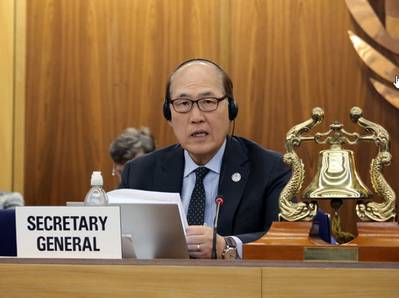Maersk Mc-Kinney Møller Center for Zero Carbon: We Need to Act Now
The Maersk Mc-Kinney Møller Center for Zero Carbon has published a call for IMO member states to act decisively on emissions targets at MEPC 80.
The critical role of IMO member states at MEPC 80 report has been published with the warning: “We need to act, and we need to act now.”
The Center notes that IPCC's most recent synthesis report delivers a clear message of caution: the pace of global surface temperature rise is surpassing any other period in the last 2,000 years, atmospheric CO2 levels now exceed those of the past two million years, and over 3.3 billion individuals are facing significant vulnerability to the effects of climate change.
In July, at MEPC 80, the IMO will review its initial GHG strategy from 2018, presenting a unique opportunity to increase shipping’s decarbonization ambitions. The document calls on policymakers to commit to ambitious decarbonization targets for 2030, 2040, and 2050, aligned with IPCC 1.5°C system requirements. This means emissions must peak before 2025, decline by 45% by 2030 with respect to 2010, reach net zero by 2050, and continue to reach net negative CO2 levels to compensate for historic emissions.
It also states that IMO member states must commit to a timeline for enforcing a combination of mid-term measures such as carbon pricing and fuel standards for GHG as soon as possible, but no later than 2028. They must also adopt the guidelines on life cycle GHG intensity of marine fuels (LCA Guidelines) developed by the correspondence group and update the Data Collection System (DCS) with more data granularity and transparency.
In the lead up to MEPC 80, some countries are calling for a phase out of GHG emissions by 2050, in line with the IPCC’s ambitions to reach net zero by 2050. However, others are calling for a more relaxed timeline, for example, aiming to phase out emissions by no later than 2100.
Among the proposals for 2030 targets are an explicit target of 37% GHG reduction compared to 2008 or a target of deriving 5% of the industry’s energy from sustainable fuels by 2030, although opinions on which fuel types are considered sustainable differ widely. There is currently no clear agreement around 2040 targets. While some countries are calling for reductions as high as 96% of GHG emissions compared to 2008, others are calling for targets of a 50% reduction or no targets at all.











